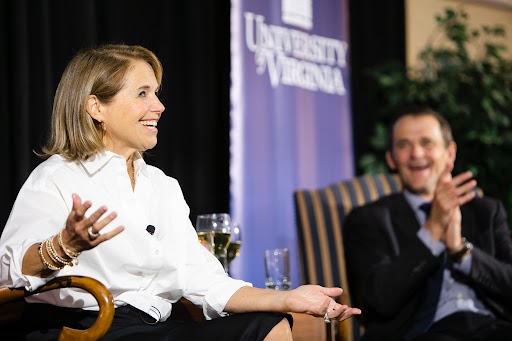Award-winning journalist and UVA alumna Katie Couric returned to her old stomping grounds for a conversation with President Jim Ryan at Alumni Hall on November 4. During the hour-long interview, the pair discussed Couric’s life and career, including her decades in TV news, cancer research advocacy, and her media company, Katie Couric Media.
Ryan kicked off the conversation by congratulating Couric on her many achievements since graduating in 1979 from UVA, where she served in several positions at The Cavalier Daily. From 1991 to 2006, Couric was a co-anchor of NBC’s “Today” show, before becoming the first solo female anchor on a nightly news broadcast on a major network with “CBS Evening News.” Couric has also worked for “60 Minutes,” ABC News, and Yahoo! News, among several other organizations; hosted her own daytime talk show, “Katie”; and authored two books.
Ryan praised Couric’s recent $1 million donation to UVA, which is being matched by the university to fund a scholarship in her name. “I wanted to return all the blessings I’ve gotten here,” Couric said.
The media mogul opened up about her battle with breast cancer, and that of her first husband, Jay Monahan, with colon cancer—one that he ultimately lost in 1998 at age 42. She emphasized the importance of quality health care.“We have a caste system in terms of medical care,” she said.
Couric encouraged female audience members to get in-depth screenings for breast cancer, explaining that almost 50 percent of women over 40 have dense breast tissue, making it harder to find tumors. She is currently working with policymakers on legislation to require health insurers to pay for breast ultrasounds for all women with dense breasts.
In addition to donating and raising money for cancer research, Couric had a colonoscopy on-air in 2000. She asserted that she wanted to destigmatize colonoscopies and raise awareness of the importance of detecting the early stages of colon cancer.
“It would be criminal to have the kind of platform I have and not educate people,” she said.
Couric also discussed what it’s like to be a journalist today and the challenges reporters face in an era of widespread misinformation and distrust of mainstream media. “People are gravitating toward affirmation rather than information,” she said.
Though Couric lamented the fractured landscape of TV and print news, she also voiced feelings of hope at the ways in which technological innovation has provided young people with ever-increasing opportunities to become creators. She expressed joy at the expanding number of minority communities that are now represented in the media industry.
During the short question-and-answer portion of the evening, Couric conveyed strong opinions on the current state of American politics and issues with mainstream media.
When asked whether she would ever consider interviewing an ultra-conservative TV news host, like Sean Hannity of Fox News, Couric expressed doubt that he and his colleagues truly believe what they are saying, making an interview futile. She deplored Fox News’ role in widening the political divide in the United States, but acknowledged left-leaning news sources’ role in fueling political polarization too. Calling Fox News founder Rupert Murdoch “Satan,” Couric accused him of “helping to destroy American democracy.”
The acclaimed journalist also reflected on some of her most iconic interviews. She recounted her experience interviewing Craig Scott and Michael Shoels—family members of the victims of the 1999 Columbine High School shooting—and the ways in which their display of raw human emotion set her on a path to make a difference.
Looking to the future, Couric envisioned herself developing a television series that takes a hard look at U.S. history. The country must learn from its mistakes before it can move forward, she said.
Closing out the interview, Couric encouraged young journalists to find things they are passionate about, and be bold in their ambition.














